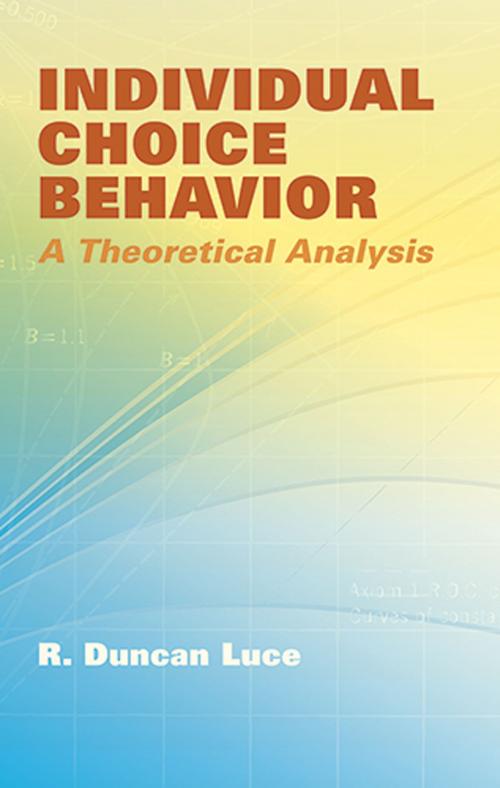Individual Choice Behavior
A Theoretical Analysis
Nonfiction, Science & Nature, Mathematics, Statistics| Author: | R. Duncan Luce | ISBN: | 9780486153391 |
| Publisher: | Dover Publications | Publication: | June 22, 2012 |
| Imprint: | Dover Publications | Language: | English |
| Author: | R. Duncan Luce |
| ISBN: | 9780486153391 |
| Publisher: | Dover Publications |
| Publication: | June 22, 2012 |
| Imprint: | Dover Publications |
| Language: | English |
This influential treatise presents upper-level undergraduates and graduate students with a mathematical analysis of choice behavior. It begins with the statement of a general axiom upon which the rest of the book rests; the following three chapters, which may be read independently of each other, are devoted to applications of the theory to substantive problems: psychophysics, utility, and learning.
Applications to psychophysics include considerations of time- and space-order effects, the Fechnerian assumption, the power law and its relation to discrimination data, interaction of continua, discriminal processes, signal detectability theory, and ranking of stimuli. The next major theme, utility theory, features unusual results that suggest an experiment to test the theory. The final chapters explore learning-related topics, analyzing the stochastic theories of learning as the basic approach—with the exception that distributions of response strengths are assumed to be transformed rather than response probabilities. The author arrives at three classes of learning operators, both linear and nonlinear, and the text concludes with a useful series of appendixes.
This influential treatise presents upper-level undergraduates and graduate students with a mathematical analysis of choice behavior. It begins with the statement of a general axiom upon which the rest of the book rests; the following three chapters, which may be read independently of each other, are devoted to applications of the theory to substantive problems: psychophysics, utility, and learning.
Applications to psychophysics include considerations of time- and space-order effects, the Fechnerian assumption, the power law and its relation to discrimination data, interaction of continua, discriminal processes, signal detectability theory, and ranking of stimuli. The next major theme, utility theory, features unusual results that suggest an experiment to test the theory. The final chapters explore learning-related topics, analyzing the stochastic theories of learning as the basic approach—with the exception that distributions of response strengths are assumed to be transformed rather than response probabilities. The author arrives at three classes of learning operators, both linear and nonlinear, and the text concludes with a useful series of appendixes.















